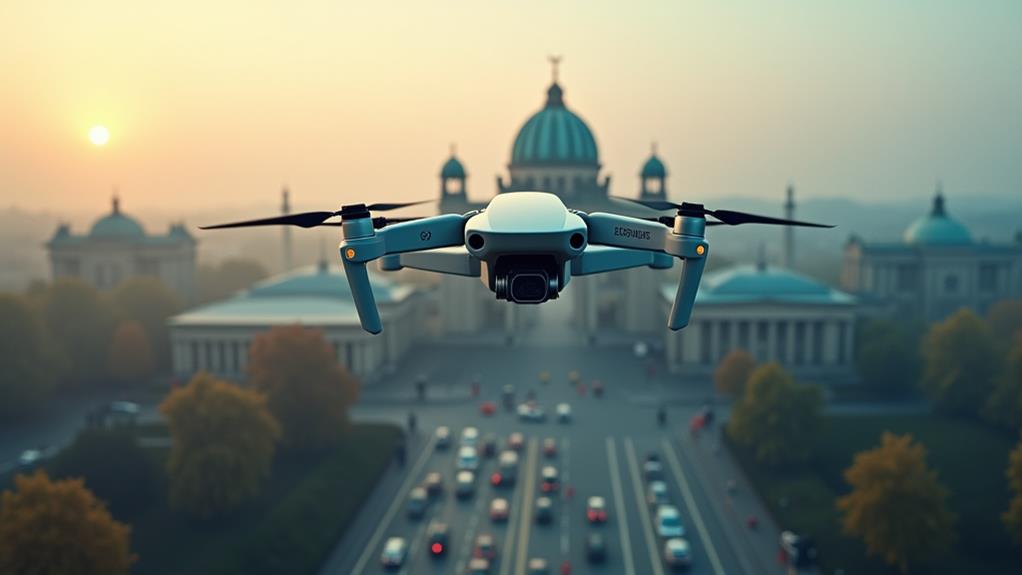
Do you think flying a drone in Germany is as simple as unpacking it and taking to the skies? Think again. While Germany's drone laws might seem complex, understanding them is vital to avoiding penalties and fines. In reality, there are five key regulations you need to know to guarantee a smooth and enjoyable flying experience. From registration to no-fly zones, certification to insurance, staying informed is the key to staying airborne. So, what are these essential laws, and how can you guarantee you're flying legally and safely in Germany?
Contents
Key Takeaways
- Register your drone with the German Federal Aviation Office (LBA) if it weighs over 250 grams, and display the unique identifier on the drone.
- Obtain a drone pilot's license if your drone weighs over 2 kilograms, and pass a simple online test to demonstrate understanding of drone regulations.
- Avoid flying in no-fly zones, including airports, national parks, industrial facilities, and crowded areas, to ensure safe and responsible drone operation.
- Respect altitude limits, staying below 100 meters above ground level, and keep your drone in sight to avoid collisions or losses.
- Consider drone insurance options to protect against accidents, damages, and third-party liability, and ensure compliance with German drone laws.
Registering Your Drone in Germany
Once registered, you'll receive a unique identifier that must be displayed on your drone.
This registration is valid for five years, and you'll need to renew it before it expires.
Additionally, you may need to obtain flight permission fees, which vary depending on the type of flight you plan to conduct.
For instance, recreational flights typically don't require permission, but commercial flights do.
It's also essential to weigh drone insurance options, which can provide financial protection in case of accidents or damage to your drone.
Drone Weight and Classifications
In Germany, you need to be aware of your drone's weight and classification, as these factors substantially impact the regulations you must follow.
The country has established specific drone categories based on weight, which determine the rules you'll need to comply with.
Drones weighing up to 250 grams fall into the "Open" category, which has the fewest regulations.
Those between 250 grams and 2 kilograms are classified as "Specific," and you'll need to register them and follow additional guidelines.
Drones over 2 kilograms are considered "Certified," requiring more extensive registration and safety protocols.
Weight limits also play a vital role in determining whether you need a license to operate your drone.
If your drone weighs over 2 kilograms, you'll need to hold a drone pilot's license, known as a "Lufthansa-Prüfungsnis."
Understanding your drone's weight and classification is essential to guarantee you're flying legally and safely in Germany.
No-Fly Zones and Restrictions
Your drone's flight path in Germany isn't without its limitations. As you plan your aerial adventures, vital knowledge is necessary to know where you can and can't fly.
Airport restrictions, for instance, are in place to safeguard safety. You're not allowed to fly within 1.5 kilometers of an airport or heliport.
Additionally, national parks and nature reserves are off-limits to protect the environment and wildlife. You'll also need to steer clear of industrial facilities, military bases, and correctional facilities.
Moreover, you're not permitted to fly over crowds, such as those at festivals, concerts, or sporting events. Other no-fly zones include disaster areas, accident sites, and areas with ongoing police operations.
It's vital to stay informed about temporary flight restrictions, which can be announced at short notice. Always check the local authorities' websites or mobile apps for the latest information before taking to the skies.
Pilot Requirements and Certification
You've got your drone and you're aware of the no-fly zones in Germany, but before you start flying, you need to guarantee you meet the pilot requirements and have the necessary certification.
In Germany, you'll need to register your drone with the German Federal Aviation Office (LBA) if it weighs more than 250 grams. You'll also need to pass a simple online test to demonstrate your understanding of drone regulations.
As a drone pilot, you'll need to meet certain medical requirements, including having normal vision and no medical conditions that could impair your ability to fly safely.
You'll also need to be at least 16 years old to fly a drone in Germany. Additionally, it's highly recommended that you consider drone insurance options to protect yourself and others in case of an accident.
Don't assume that your regular insurance policy covers drone-related incidents – make sure you have a policy that specifically covers drone usage.
Operating Drone Rules and Guidelines
As you prepare to take to the skies, familiarize yourself with Germany's operating drone rules and guidelines to warrant a safe and enjoyable flight.
Before flying, you'll need to plan your flight carefully, considering factors like weather, air traffic, and restricted areas. This is known as Flight Planning, and it's vital to verify you're flying safely and legally.
Germany requires drone insurance, so you'll need to obtain Drone Insurance that covers third-party liability. This will protect you in case of accidents or damage to people or property.
You'll also need to respect altitude limits, staying below 100 meters above ground level and avoiding areas like airports, national parks, and military bases. Additionally, always keep your drone in sight and avoid flying over populated areas or large crowds.
Frequently Asked Questions
Can I Fly My Drone Over People or Crowds in Germany?
You can't fly your drone over people or crowds in Germany without ensuring crowd safety; you'll need a special drone permit, which requires proof of adequate insurance and a risk assessment to guarantee public safety.
Do I Need Drone Insurance to Fly in Germany?
You're not legally required to have drone insurance to fly in Germany, but it's highly recommended to protect yourself from drone liability claims; consider purchasing aviation policies that cover damages and accidents.
Can I Fly My Drone at Night in Germany?
You can't fly your drone at night in Germany without special permission, as Night Flying is heavily restricted; however, you're allowed to fly during twilight hours with Airborne Illumination, but only with a license and explicit approval from authorities.
How Do I Handle a Drone Crash or Accident in Germany?
Frightful flight failures happen! You'll need to secure the crash site, gather drone salvage, and complete an incident report, including witness statements, to comply with German authorities and potentially salvage your damaged drone and reputation.
Can I Fly My Drone Near Airports or Helipads in Germany?
You must respect airport restrictions and helipad boundaries in Germany, keeping a safe distance of 1.5 kilometers from airport perimeters and 100 meters from helipad boundaries to avoid fines and guarantee safe drone operation.
Conclusion
You've made it through the essentials of flying drones in Germany, but don't think you're out of the woods just yet! One misstep, and you could be facing fines or even having your drone confiscated. Stay vigilant, and remember: registration, weight classifications, no-fly zones, pilot certification, and operating rules are all vital to avoiding trouble. Fly responsibly, and you'll be soaring the German skies in no time – but slip up, and you'll be grounded.





